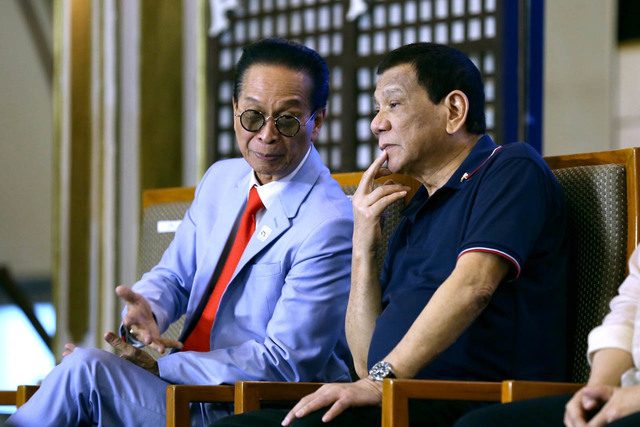SUMMARY
This is AI generated summarization, which may have errors. For context, always refer to the full article.

MANILA, Philippines – President Rodrigo Duterte’s chief legal adviser has recommended the signing of the controversial anti-terrorism bill.
Chief Presidential Legal Counsel Salvador Panelo announced his recommendation through a statement sent to media on Independence Day, June 12.
“After a careful and thoughtful review of the anti-terrorism bill, this representation has recommended the approval and the signing of the proposed legislative measure to the President,” said Panelo.
That same day, protests were held in Quezon City and Cebu City against the bill. Critics said the proposed measure gives dangerous powers to the executive branch that could be used to quell dissent and freedom of speech.
But Panelo said his office believed that the bill has “sufficient” safeguards against government abuse.
Without being specific, the lawyer said the bill’s provisions empower the executive branch to crack down on terrorists and suspected terrorists “without violating the latter’s political and civil rights, as protected by the 1987 Constitution and recognized through globally accepted norms.”
The provisions, he claimed, “pass the constitutional test.”
“Aside from this, there are remedies under our basic Charter, together with relevant laws and rules, which are in place against abuses on the part of government agents, such as availing protective writs from courts of law,” Panelo added.
‘Imagined’ threats? Panelo sought to downplay warnings from human rights groups, respected lawyers, a retired Supreme Court justice, business groups, and journalists that the bill could threaten democratic freedoms.
“Fears which were raised by certain sectors are more imagined than real,” he said, as he urged them to study the measure’s provisions so they can “understand fully the spirit of the bill.”
He insisted that the proposed law is “intended solely against terrorists” and is “definitely not against citizens who peacefull dissent against – and criticize” the government.
Experts list down dangers. Lawyers’ groups and even the constitutional office Commission on Human Rights, have sounded the alarm over the 2020 anti-terror bill.
They’ve pointed out the following red flags:
- The Anti-Terrorism Council composed of Cabinet officials can order the arrest of suspected terrorists even without a court order.
- Because the proposed law expands the types of crimes that can make a person a suspected terrorist, more people can be arrested. One such proposed crime is “inciting to terrorism” which means a person can be considered a suspected terrorist if they write, speak, or express themselves in a way the ATC says is inciting to terrorism.
- A suspected terrorist can be kept in custody for up to 24 days, 8 times more than the current 3-day limit allowed by the Constitution for crimes like rebellion.
- A court can make a “preliminary” declaration that a person is a terrorist in 72 hours. In the current anti-terrorism law, the court could make no preliminary proscription and had to conduct a full trial before making labelling someone a terrorist.
Public alarm over the measure was enough to convince lawmakers, including an author of a similar bill in the House of Representatives, to withdraw their support for it.
Well-loved actors and celebrities also made public stands against the measure.
When will Duterte decide? The 2020 anti-terrorism bill is already with Duterte’s office. He has 30 days from June 9 (when Malacañang received the bill) to act on it.
He has 3 options: sign it, veto it, or do nothing and the bill lapses into law in 30 days.
Presidential Spokesman Harry Roque said Duterte will likely consider the Department of Justice (DOJ) review of the bill before making his decision.
Justice Secretary Menardo Guevarra had told Rappler that his department aims to submit his review to Malacañang on June 30 “at the latest.”
The office of Executive Secretary Salvador Medialdea will then consolidate all inputs and make a recommendation to Duterte.
But many expect the President to sign it since he had certified the measure as urgent, leading the House to hasten its passage. – Rappler.com
Add a comment
How does this make you feel?
There are no comments yet. Add your comment to start the conversation.